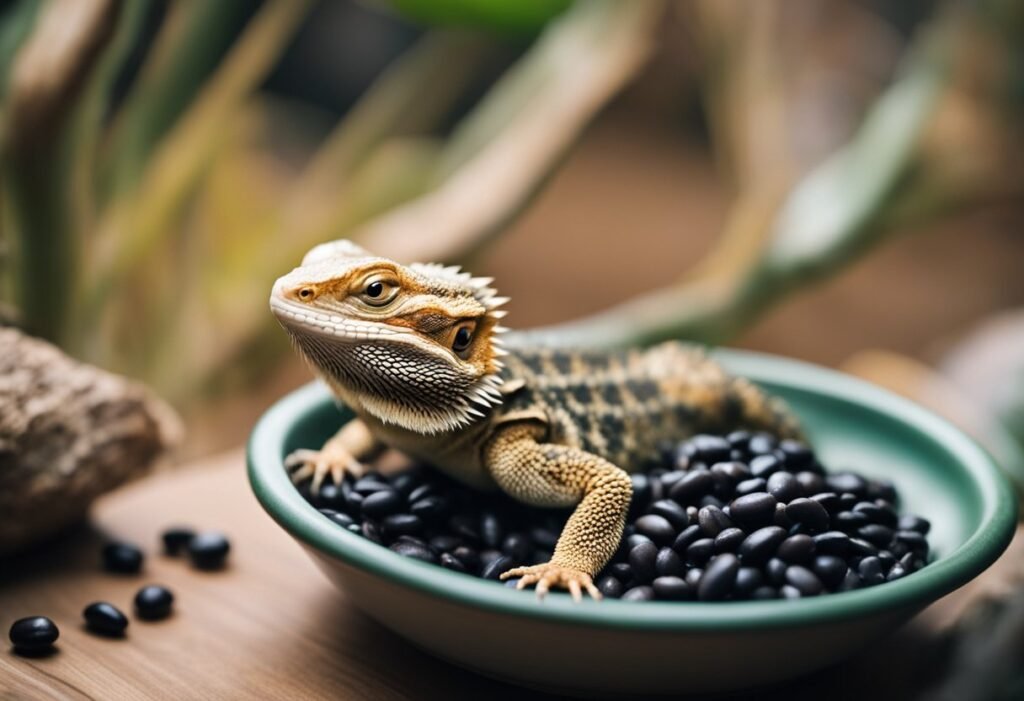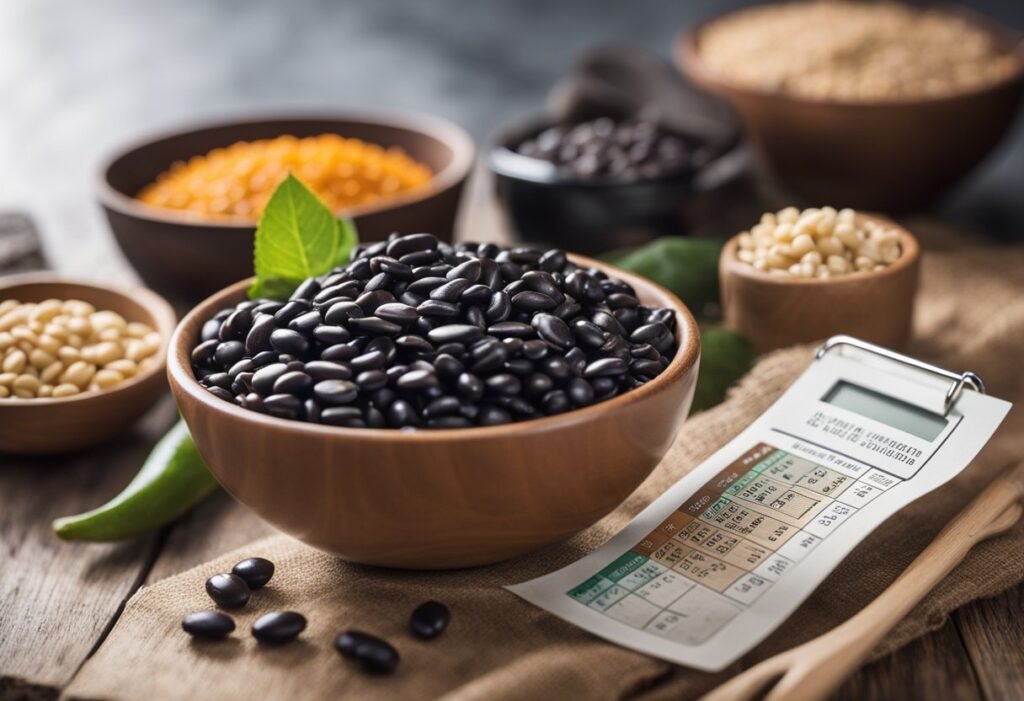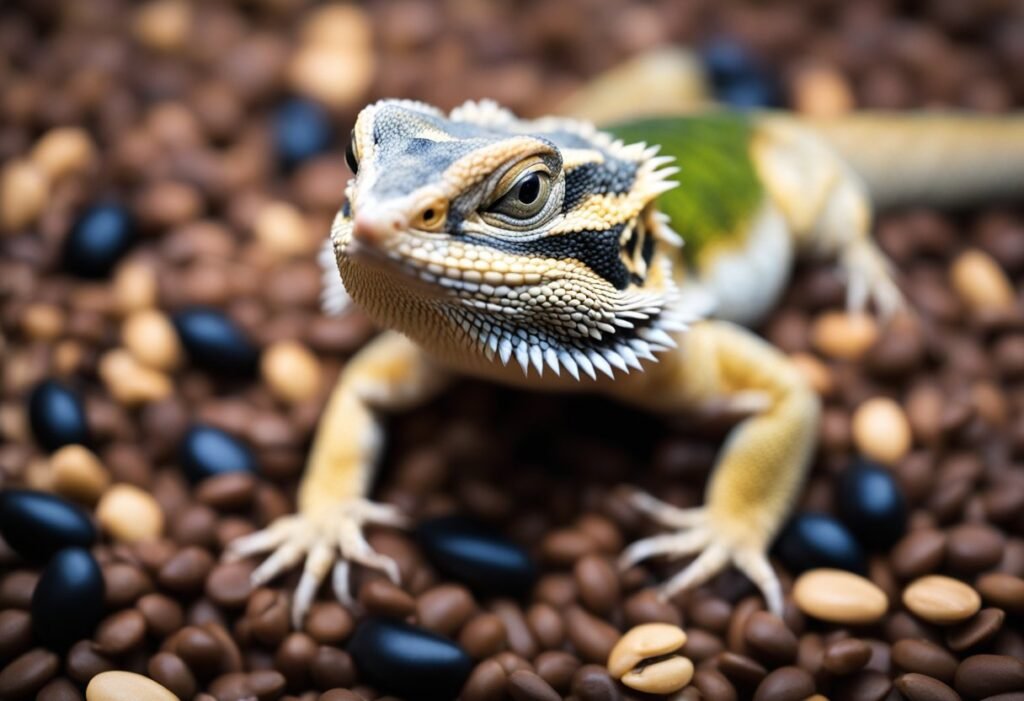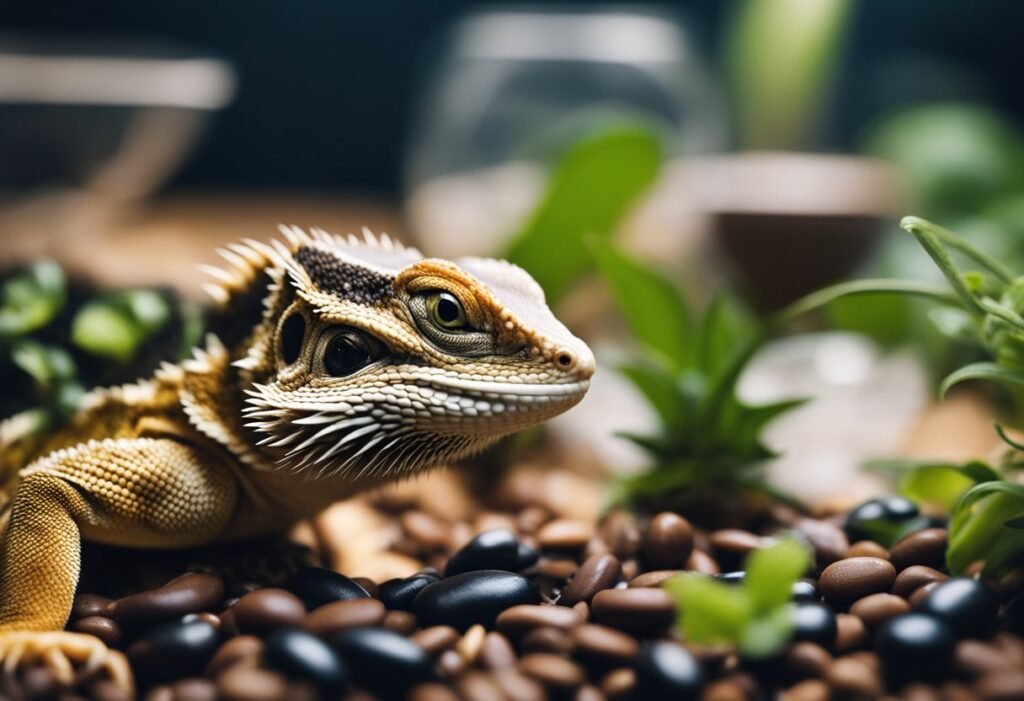Bearded dragons are omnivorous reptiles that require a balanced diet to maintain their health and wellbeing. As such, it is important for their owners to provide them with a variety of foods that meet their nutritional needs. While some foods are safe and healthy for bearded dragons, others can be harmful or even toxic. One food that is often questioned is black beans.
Black beans are a type of legume that are commonly consumed by humans. They are a good source of protein, fiber, and other nutrients. However, when it comes to feeding black beans to bearded dragons, there is some debate. Some sources suggest that black beans can be a healthy addition to a bearded dragon’s diet, while others caution against feeding them to these reptiles.
In this article, we will explore the question of whether bearded dragons can eat black beans. We will examine the nutritional value of black beans, the potential risks and benefits of feeding them to bearded dragons, and provide recommendations for incorporating them into a balanced diet. By the end of this article, you will have a better understanding of whether or not black beans are a suitable food for your bearded dragon.
Can Bearded Dragons Eat Black Beans?

As responsible pet owners, we want to ensure that our bearded dragons are receiving a balanced and nutritious diet. While bearded dragons are omnivores and can eat a variety of fruits, vegetables, and insects, it’s important to know which foods are safe for them to consume. In this section, we will discuss whether or not bearded dragons can eat black beans.
Black beans are a type of legume that are commonly consumed by humans. They are a good source of protein, fiber, and various vitamins and minerals. However, when it comes to bearded dragons, black beans are not recommended as a regular part of their diet.
One of the main reasons why black beans are not ideal for bearded dragons is because they contain high levels of phytic acid. Phytic acid can bind to minerals such as calcium and prevent them from being absorbed by the body. This can lead to mineral deficiencies and other health issues.
In addition to phytic acid, black beans also contain lectins. Lectins are a type of protein that can be toxic to animals, including bearded dragons. While small amounts of lectins may not cause harm, consuming large amounts can lead to digestive issues and other health problems.
Overall, while bearded dragons may be able to eat black beans in small amounts as an occasional treat, they should not be a regular part of their diet. Instead, we recommend feeding your bearded dragon a variety of other fruits, vegetables, and insects that are safe and nutritious for them to consume.
Nutritional Value of Black Beans

Black beans are an excellent source of plant-based protein, fiber, and essential nutrients. They are a popular ingredient in many cuisines, including Mexican, Caribbean, and South American. Here are some of the key nutritional benefits of black beans:
Protein
Black beans are a great source of protein, with around 15 grams of protein per cup. This makes them an excellent option for vegetarians and vegans who are looking to increase their protein intake. Protein is essential for building and repairing tissues in the body, including muscle tissue.
Fiber
Black beans are also an excellent source of fiber, with around 15 grams of fiber per cup. Fiber is important for maintaining digestive health, regulating blood sugar levels, and reducing the risk of heart disease.
Vitamins and Minerals
Black beans are rich in vitamins and minerals, including folate, iron, and magnesium. Folate is important for fetal development during pregnancy, while iron is essential for transporting oxygen throughout the body. Magnesium is important for bone health and plays a role in regulating blood pressure.
Antioxidants
Black beans are also a good source of antioxidants, which are compounds that help protect the body against damage from free radicals. Free radicals are unstable molecules that can cause damage to cells and contribute to the development of chronic diseases.
In summary, black beans are a nutritious and delicious addition to any diet. They provide a range of essential nutrients, including protein, fiber, vitamins, and minerals, and are a great option for vegetarians and vegans.
Potential Health Risks
As with any new food, it is important to consider the potential health risks associated with feeding black beans to your bearded dragon.
Firstly, black beans are high in protein and fiber, which can be difficult for bearded dragons to digest. This can lead to digestive issues such as bloating, constipation, and diarrhea. It is important to monitor your bearded dragon’s stool and behavior after feeding them black beans.
Secondly, black beans contain a compound called phytic acid, which can bind to essential minerals such as calcium and prevent their absorption. This can lead to mineral deficiencies and health issues such as metabolic bone disease. It is important to ensure that your bearded dragon is getting enough calcium and other essential minerals in their diet if you choose to feed them black beans.
Lastly, black beans contain lectins, which can be harmful to bearded dragons in large quantities. Lectins can cause damage to the intestinal lining and lead to inflammation and other health issues. It is important to feed black beans in moderation and as part of a balanced diet.
Overall, while black beans can be a nutritious addition to your bearded dragon’s diet, it is important to be aware of the potential health risks and to feed them in moderation.
Proper Feeding Guidelines for Bearded Dragons

When it comes to feeding your bearded dragon, it is important to follow proper feeding guidelines to ensure they receive a balanced diet. Here are some guidelines to consider:
Balanced Diet
A balanced diet for a bearded dragon consists of a variety of insects, vegetables, and fruits. Insects such as crickets, mealworms, and dubia roaches provide protein, while vegetables such as collard greens, kale, and carrots provide essential vitamins and minerals. Fruits such as strawberries, blueberries, and mangoes should be given in moderation as they are high in sugar.
It is important to provide a variety of food to prevent nutrient deficiencies. We recommend offering a mix of insects and vegetables every day, with fruits given as occasional treats.
Feeding Frequency
Bearded dragons should be fed once a day, with insects and vegetables offered separately. Younger bearded dragons may require more frequent feedings, up to twice a day, to support their growth.
It is important to note that bearded dragons are opportunistic feeders and will eat as much as they can if given the chance. Overfeeding can lead to obesity and other health issues, so it is important to monitor their food intake.
Portion Size
The amount of food a bearded dragon needs depends on their age, size, and activity level. As a general guideline, insects should make up 20-30% of their diet, while vegetables should make up the remaining 70-80%.
We recommend offering insects in small amounts, around 5-10 at a time, and removing any uneaten ones after 15-20 minutes. Vegetables should be offered in larger amounts, with a variety of options provided.
In conclusion, following proper feeding guidelines is essential for the health and well-being of your bearded dragon. By providing a balanced diet, feeding at the appropriate frequency, and monitoring portion sizes, you can ensure your pet stays healthy and happy.
Alternative Foods for Bearded Dragons
If you’re looking to add some variety to your bearded dragon’s diet, there are plenty of alternative foods to try. Here are some options to consider:
Vegetables
Bearded dragons love vegetables, and they’re an important part of their diet. Some good options to try include:
- Collard greens
- Mustard greens
- Kale
- Squash
- Carrots
- Sweet potatoes
When feeding vegetables, it’s important to chop them into small pieces to make them easier for your dragon to eat. You can also try mixing them with other foods to make them more appealing.
Fruits
Fruits are another great option to try. Some good choices include:
- Apples
- Bananas
- Berries
- Mangoes
- Papayas
- Pears
Like with vegetables, it’s important to chop fruits into small pieces and mix them with other foods to make them more appealing.
Insects
Insects are an important part of a bearded dragon’s diet, and there are plenty of options to choose from. Some good choices include:
- Crickets
- Dubia roaches
- Mealworms
- Superworms
- Waxworms
When feeding insects, make sure they are gut-loaded (fed a nutritious diet) and dusted with calcium powder to ensure your dragon is getting all the nutrients they need.
Overall, there are plenty of alternative foods to try if you’re looking to add some variety to your bearded dragon’s diet. Just make sure to do your research and provide a balanced diet to keep your dragon healthy and happy.
Frequently Asked Questions

Are raw black beans safe for bearded dragons to eat?
No, raw black beans are not safe for bearded dragons to eat. Raw beans contain a substance called lectin, which can be toxic to bearded dragons. It is important to always cook beans before feeding them to your bearded dragon.
Can bearded dragons eat black beans daily?
No, bearded dragons should not eat black beans daily. Although black beans are a good source of protein and fiber, they should only be fed to bearded dragons as an occasional treat. A varied diet that includes a mix of protein, vegetables, and fruits is best for bearded dragons.
What types of beans are safe for bearded dragons to consume?
Cooked and properly prepared legumes, such as lentils, chickpeas, and kidney beans, can be safely fed to bearded dragons in moderation. However, it is important to avoid feeding them raw or undercooked beans, as well as canned beans that contain added salt or preservatives.
Is it safe for bearded dragons to eat cooked pinto beans?
Yes, cooked pinto beans are safe for bearded dragons to eat in moderation. Pinto beans are a good source of protein and fiber, but should only be fed to bearded dragons as an occasional treat.
What foods are toxic to bearded dragons?
Bearded dragons should not be fed avocado, rhubarb, or chocolate, as these foods are toxic to them. Additionally, any food that is high in oxalates, such as spinach and kale, should be fed in moderation.
What vegetables should be avoided when feeding bearded dragons?
Bearded dragons should not be fed vegetables that are high in oxalates, such as spinach, kale, and beet greens. Additionally, vegetables that are high in goitrogens, such as broccoli and cabbage, should be fed in moderation. It is important to provide a variety of vegetables to ensure a balanced diet for your bearded dragon.

I, Mark Antonelli am highly interested in pet care tips. The experiences I gained through university life in animal sciences were also helpful to identify the best tricks for caring for and feeding varying kinds of pets. I know the majority of people love to own a pet. Yet, there is a guilty of owing a Bearded Dragon due to a lack of information about how much friendly and peaceful they are. I thought of filling this gap with detailed writings about this Pogona genus Bearded Dragon. All my team is also giving me great support to fulfil my mission. Hope you will enjoy the journey with us.

